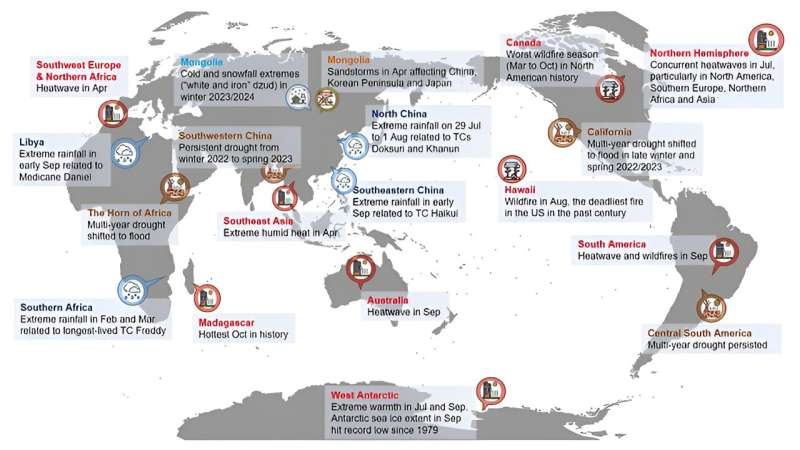This article has been reviewed according to Science X's editorial process and policies. Editors have highlighted the following attributes while ensuring the content's credibility:
fact-checked
peer-reviewed publication
trusted source
proofread
Weather and climate extremes in 2023 impacting the globe with emerging features

Globally, last year was the warmest for thousands of years, with a globally averaged temperature of at least 1.45°C greater than pre-industrial times. The year also saw an unprecedented string of extreme weather and climate events in many parts of the world, including heat waves, torrential rainfall, transitions from drought to floods, wildfires, and sandstorms.
A year on, scientists at the Chinese Academy of Science's Institute of Atmospheric Physics, the Met Office in the UK, Sorbonne Université in France, the Max Planck Institute for Meteorology in Germany, Instituto Argentino de Nivología, Glaciología Y Ciencias Ambientales in Argentina and China Meteorological Administration's Shanghai Typhoon Institute, have had a look back at the year.
The team reviewed the facts and current physical understanding of the year's events and put them in context relative to the past and future to provide a better understanding of the roles of internal climate variability and anthropogenic climate change. The work is published in Advances in Atmospheric Science.
The report also highlights emerging features associated with many of the events of 2023, including heat extremes occurring earlier in the year and increasingly simultaneously in differing parts of the world, such as in July and cyclones exacerbating rainfall extremes in North China in July and Libya in September).
Meanwhile, multi-year droughts in California and the Horn of Africa have transitioned into floods. Ecosystems have also come under immense pressure due to wildfires, for example, in Hawaii and Canada, causing widespread damage and threatening CO2 reduction targets aimed at limiting future warming.
"Many of 2023's events are consistent with projected future changes in a warmer world, showing the challenges that are to come, while some were a surprise, suggesting that there is still more to learn about what's potentially around the corner," said Dr. Wenxia Zhang, the lead author of the paper. Of them, one is the changing seasonality of extreme events.
"We're seeing extremes appearing in seasons in which they're usually less likely. Heat waves, for example, appeared in spring 2023 in southwestern Europe, Brazil, Morocco, and South Africa," said Dr. Robin Clark of the Met Office in the UK, a co-author of the study.
The past year has also highlighted a very worrying signal regarding transitions between droughts and floods, an area of science requiring further research which is also required in order to provide better warnings, such as those to be covered by a UN initiative, "Early Warnings for All" whose aim is to provide warnings worldwide by 2027.
As Dr. Chao Li, another co-author, says, "Good warning systems will be an essential part of helping the world to cope with the coming onslaught of events in the next few decades."
More information: Wenxia Zhang et al, 2023: Weather and Climate Extremes Hitting the Globe with Emerging Features, Advances in Atmospheric Sciences (2024). DOI: 10.1007/s00376-024-4080-3
Journal information: Advances in Atmospheric Sciences
Provided by Chinese Academy of Sciences




















